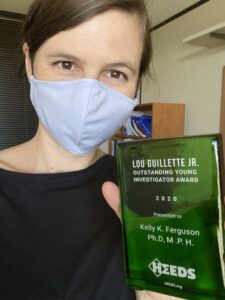 Kelly K. Ferguson, Ph.D./M.P.H, a tenure track epidemiologist at The National Institute of Environmental Health Sciences (NIEHS), is the 2020 winner of the Lou Guillette, Jr. Outstanding Young Investigator award. This award comes with a $5000 honorarium and a recycled glass plaque.
Kelly K. Ferguson, Ph.D./M.P.H, a tenure track epidemiologist at The National Institute of Environmental Health Sciences (NIEHS), is the 2020 winner of the Lou Guillette, Jr. Outstanding Young Investigator award. This award comes with a $5000 honorarium and a recycled glass plaque.
The award, in honor of Lou Guillette, Jr., is given to an early-career scientist working in some aspect of endocrine disruptor research. Someone who is recognized as a creative, dedicated scientist who at an early stage of their career is already having an impact on human health and who has a special love of and dedication to mentoring. Someone who, like Lou Guillette, Jr., is a good communicator and who is willing to go beyond to help trainees succeed.
 Dr. Ferguson received her Ph.D. from the University of Michigan in 2014. She completed a post-doctoral fellowship at the University of Michigan School of Public Health in 2015 and moved to NIEHS in 2015.
Dr. Ferguson received her Ph.D. from the University of Michigan in 2014. She completed a post-doctoral fellowship at the University of Michigan School of Public Health in 2015 and moved to NIEHS in 2015.
Her research focus is on the role of short half-life EDCs (phthalates, pesticides, trace metals) on pregnancy outcomes. She uses both lab-based and epidemiological analyses to study the effects of chemical exposures resulting from consumer product use during pregnancy and their cumulative impact on fetal growth within the LIFECODES birth cohort (PI: Thomas McElrath) and NIH-based Generation R cohort. She is also highly focused on inflammation as a potential mediator of placenta-based disease during pregnancy and on developing oxidative stress markers. She is one of few investigators that currently investigates how oxidative stress outcomes are modified by cumulative EDC exposures. She is also building datasets of exposure and disease outcomes to better understand combinations of exposures that may exacerbate a disease outcome or work through a common mode of action.
She has trained or advised at least 6 Ph.D., a dozen MPH or equivalent level trainees, and currently is advising several students and 2 of her own post-doctoral fellows. As noted by a previous mentee, Dr. Ferguson has a sincere dedication to mentorship. She takes time to work personally with trainees, helps them understand the science, logistics, and business sides of science, and advises them on developing independent research programs. For her mentoring activities she was recognized with by NIEHS with its Mentor of the year award in 2018.
We at HEEDS congratulate Dr. Ferguson for becoming the 2020 award winner. We also note the outstanding early-stage scientists who were nominated for the award. Kelly and all the nominated scientists indicate the field of endocrine disruption has a bright future of helping to improve human and wildlife health.
